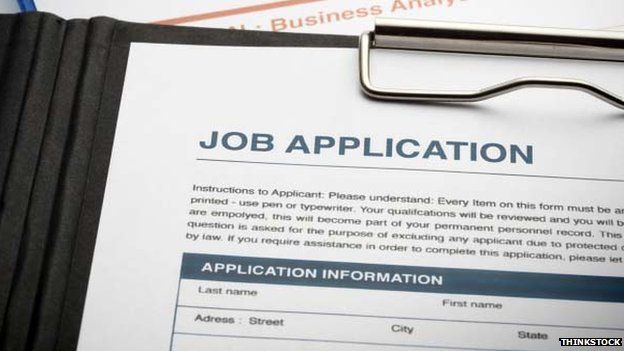Employers receive an average of 60 applicants for every advertisement for a low-skilled job, and 20 for every skilled job.
Significantly, almost half of these candidates are perfectly suitable for the role, according to research by the Chartered Institute of Personnel and Development (CIPD)
So that makes their CV – or curriculum vitae – all the more important when attempting to stand out from the crowd.
Experts say there are some golden rules for getting a CV correct, not least accuracy, spelling and grammar.
Don’t repeat the mistakes, they say, of a lawyer who stressed his “dew diligence”, or the applicant who ignored commas when describing his interests as “cooking dogs and interesting people”.
Key points
 Image copyrightTHINKSTOCK
Image copyrightTHINKSTOCKIf sending a CV as a hard copy, along with a job application, then it needs to be neat and typed if possible. Most libraries have public computers which can be used by those who do not have their own.
Increasingly, applicants are asked to send a digital copy of a CV. If this is the case then the first set of “eyes” to see it might be an automated search for key words, so experts suggest applicants ensure mandatory requirements in the job advert are included in a CV.
Corinne Mills, managing director of Personal Career Management, which provides career coaching, says that digital CVs should be in a simple format and font so readability is not affected on different screens.
Other tips from Mrs Mills, the CIPD, and the National Careers Service include:
- Tailor a CV to a specific job – it is vital to ensure the script is relevant to each job application, rather than sending the same generic CV
- Keep it simple – it should be easy to read and use active language. Two pages of A4 is enough with a mini profile included in the first half page
- Include key information – personal details, including name, address, phone number, email address and any professional social media presence should be clear. A date of birth is no longer needed, owing to age discrimination rules. A photo is only essential for jobs such as acting and modelling, otherwise it is a matter of choice
- Showcase achievements – offer evidence of how targets were exceeded and ideas created, but always be honest
- Check and double check – avoid sloppy errors, take a fresh look the next day and ask for a second opinion from a trusted friend or colleague
Desperate measures
 Image copyrightDAN CONWAY
Image copyrightDAN CONWAY

Dan Conway, 29, from Newcastle, spent four years after university searching for a permanent job in his chosen field of marketing.
Frustrated while moving in and out of temporary jobs, he decided he needed to stand out from other candidates. He took extreme measures.
His 17 job-seeking stunts included standing in a busy street with “Employ me” written across his chest, making home videos featuring his daughter, and promoting his cause at the gravy wrestling championships.
He charted his efforts on a website, which quickly gained attention. He says some of his stunts went viral on the internet and he soon received interest from employers.
He now works for one of those companies who got in touch – Vitamins Direct – as head of web sales and online marketing.
Changing CVs
Mrs Mills says it is important that applicants put modesty aside and show self-confidence in their CV.
“If you are not confident about your skills and abilities then why should an employer have faith in you,” she says.

CVs have been around for years and Ruth Stuart, research adviser at the CIPD, says that she expects their format to evolve as technology changes.
Some employers are asking for video CVs, where applicants describe their skills and experience on a short video filmed on their smartphone, or requesting jobseekers complete application forms online.
However, she argues that CVs will always be useful.
“If your CV is always up-to-date then you can quite easily fill in those online applications because you have got all that information to hand,” she says.
Help and examples
There are plenty of useful tools and templates to assist people writing up their CV for the first time, or brushing up an existing one.
The National Careers Service has a CV writing factsheet and a CV builder with various tips and templates.
For those looking for a job, a database of jobs held by Jobcentre Plus is a good place to start.
In addition, there is a separate database of jobs in Northern Ireland.
Skills Development Scotland has advice on finding a job, dealing with redundancy and links to Scotland-specific job sites.
Careers Wales has bi-lingual advice covering all these areas and also includes help for jobseekers under the age of 19.
Global tips
CVs can be produced in a different format for job applications outside of the UK.
For example, the equivalent of the CV in the US is the “resume”.
This has much the same aims by outlining job talents, work history, education and career goals, as well as how a candidate’s experience and skills would be suited to the job being advertised.
One guide to writing resumes and cover letters is on the New York State Department of Labor’s website.



